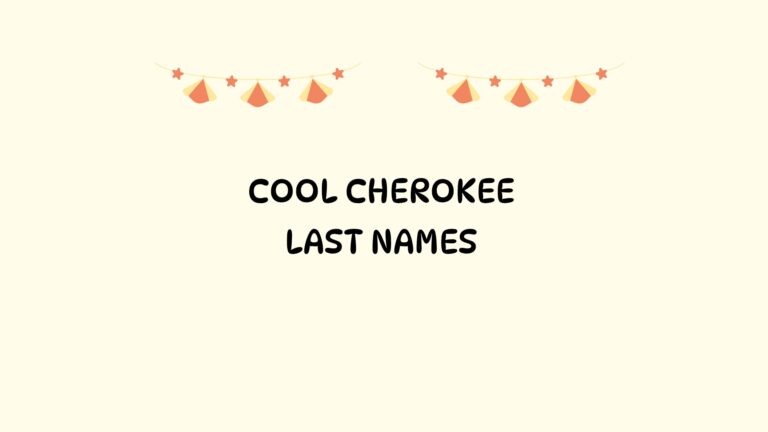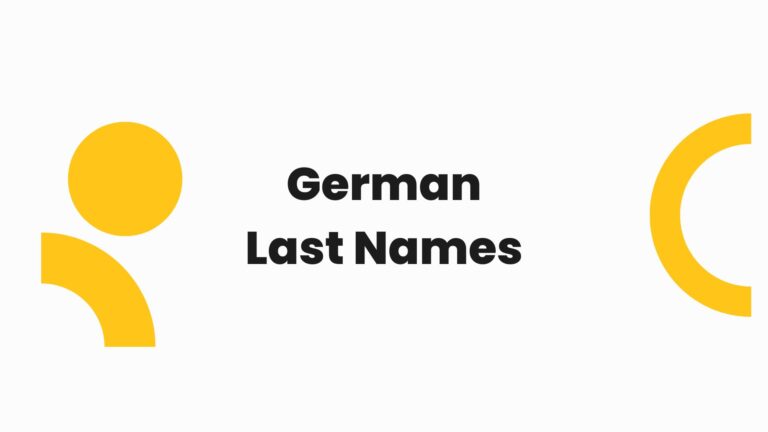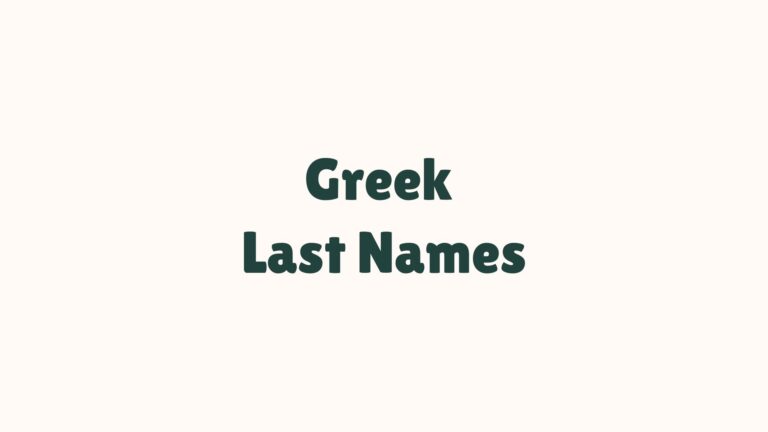100 Cool Hebrew Last Names
The Hebrew last names are not only the names that signify the culture and history of the Jewish communities but also the names that represent the values and the heritage of the Jewish people.
Quite a number of Hebrew surnames have their origins in the bible, and the meanings of these surnames are often related to the biblical names or themes.
Some of the surnames may point at the trade, the region where the person came from or even his physical attributes; the others may refer to the ancestors who shaped Jewish history.
In this post, I will try to list and explain the meaning of Hebrew last names, as well as the history that is associated with these surnames.
Hebrew Last Names
Cohen – Meaning “priest,” this surname traces back to the Jewish priestly class, descendants of Aaron, the brother of Moses.
Levi – Derived from the Hebrew name “Levi,” meaning “joined” or “attached,” referring to the Levite tribe, who were responsible for religious duties in ancient Israel.
Mizrahi – Means “eastern” in Hebrew, indicating someone from the eastern part of the Jewish diaspora, often referring to Jews from Middle Eastern or North African countries.
Katz – An acronym for “Kohen Tzedek,” meaning “righteous priest,” indicating a descendant of the priestly Kohen family.
Shapiro – Possibly derived from “Saper,” meaning “scribe” in Hebrew, referring to a person who worked as a religious or legal scribe.
Ben-David – Meaning “son of David,” referring to descendants of the biblical King David.
Rosenthal – From the German “rosen” (rose) and “thal” (valley), this surname often represents a poetic and naturalistic reference, implying a valley of roses.
Goldstein – A combination of “gold,” symbolizing wealth or value, and “stein,” meaning stone, often indicating a family with wealth or influence.
Freedman – Derived from the Hebrew word for “free,” indicating a person who was a freed slave or had a high social status.
Rosenberg – Meaning “rose mountain,” this surname suggests a connection to nature, often used by Jewish families from German-speaking regions.
Abrams – Derived from the Hebrew name “Avraham” (Abraham), meaning “father of many nations,” indicating a familial link to the patriarch.
Stern – Meaning “star” in Hebrew or Yiddish, symbolizing someone who is bright or prominent, often used by Ashkenazi Jews.
Goldman – Meaning “gold man,” this surname suggests someone involved in the gold trade or a wealthy individual.
Berg – Derived from the Yiddish word for “mountain,” this surname often indicated a family from a mountainous region or one with a strong, enduring character.
Klein – Meaning “small” in German and Yiddish, often referring to a person who was physically small or part of a smaller community.
Hoffman – Derived from “Hof,” meaning “farm” or “court,” and “man,” meaning “man,” often referring to someone who worked or lived near a farm or estate.
Zucker – Meaning “sugar” in Yiddish, this surname could be a nickname for a sweet or kind person or refer to someone who worked in the sugar trade.
Schwartz – Meaning “black” in German, this surname may have referred to a person with dark features or a family living in a darker region.
Weiss – Meaning “white” in German, this surname could indicate someone with light features or associated with purity or righteousness.
Segal – Derived from “Segan Leviah,” meaning “assistant to the Levite,” referring to a role in ancient Jewish temple service.
Gordon – From the Hebrew “Gord,” meaning “a powerful” or “a strong person,” this surname was popular in Eastern European Jewish communities.
Tannenbaum – Meaning “fir tree,” this surname likely originated from families who lived near a forest of fir trees or had a connection to nature.
Baruch – Derived from the Hebrew word for “blessed,” often used to indicate a family that was considered fortunate or divinely favored.
Kramer – Derived from the Yiddish word for “merchant” or “trader,” this surname suggests a family involved in commerce or trade.
Eisenberg – Meaning “iron mountain,” this surname could refer to a family with a strong, resilient character or one that lived near an iron-rich area.
Schneider – Meaning “tailor” in German, this surname was likely adopted by a Jewish family involved in the clothing or tailoring business.
Wolf – Derived from the German and Yiddish word for “wolf,” symbolizing strength, courage, or a family leader.
Shulman – Derived from the Yiddish word for “teacher,” this surname often indicated a family with ties to education or religious instruction.
Halpern – Likely derived from the Hebrew word “halper,” meaning “helper” or “assistant,” referring to a person in a supportive role.
Levin – Derived from the Hebrew name “Levi,” signifying a connection to the Levite tribe, who served in religious duties.
Rabinowitz – Derived from “rabbi,” meaning “teacher,” and “witz,” a diminutive suffix meaning “son of,” indicating a rabbi’s family.
Shulman – Meaning “schoolman” in Yiddish, this surname could indicate someone involved in religious education or community teaching.
Ginsburg – Derived from “gins,” meaning “gin,” and “burg,” meaning “fortress,” this surname could indicate a family that lived near or worked with a distillery or fortress.
Finkelstein – Derived from “finkel,” meaning “diamond,” and “stein,” meaning “stone,” referring to someone with a connection to diamonds or precious stones.
Mandel – Meaning “almond,” this surname may have originally referred to someone who grew or sold almonds, or it could symbolize sweetness or fertility.
Horowitz – Derived from a town name, Horovice, this surname often indicated a family’s origin from that area.
Pasternak – Likely derived from the Yiddish word for “parsnip,” referring to a family involved in agriculture or farming.
Sassoon – Derived from the Hebrew word for “happiness” or “joy,” often given to a family known for their good fortune or jovial nature.
Zilberman – Derived from “zilber,” meaning “silver,” and “man,” indicating a family that dealt with silver or was known for their wealth.
Feinstein – Derived from “fein,” meaning “fine,” and “stein,” meaning “stone,” symbolizing a family with a reputation for elegance or refinement.
Rosenfeld – Meaning “rose field,” this surname likely refers to someone who lived near a field of roses or had a connection to flowers.
Cohenfeld – Derived from “Cohen” (priest) and “feld” (field), indicating someone who held a position of religious authority or influence.
Berman – Derived from “ber,” meaning “bear,” and “man,” possibly indicating strength, courage, or a family that lived in a bear-rich area.
Tzvi – Meaning “deer” in Hebrew, this surname could symbolize grace, swiftness, or gentleness.
Kaufman – Derived from “kauf,” meaning “purchase,” and “man,” meaning “man,” often referring to a merchant or businessperson.
Ben-Ami – Meaning “son of my people,” this surname reflects strong familial or national pride.
Mandelbaum – From “mandel” (almond) and “baum” (tree), indicating a family that worked with almonds or lived near almond trees.
Drucker – Derived from the Yiddish word for “printer,” referring to a family involved in the printing business.
Zohar – Meaning “light” or “radiance,” this surname can symbolize someone bright, or it could refer to someone associated with sacred texts, like the “Zohar,” a central text in Kabbalistic teachings.
Shamir – Derived from the Hebrew word for “thorn,” symbolizing a strong or resilient family, or possibly referring to a person with a sharp or prickly personality.
Abramsky – Derived from the Hebrew name “Avraham,” meaning “father of many nations,” and the Slavic suffix “-sky,” indicating a family originating from a specific place or region.
Alon – Meaning “oak tree,” symbolizing strength and endurance, often referring to a person who is solid and unyielding.
Baskin – Likely derived from “bask,” meaning “to enjoy” or “to bask,” indicating a joyful or peaceful family.
Baron – Derived from “baron,” meaning “son” in Aramaic, often indicating a person from a noble or distinguished family.
Berman – Derived from the word “ber,” meaning “bear,” symbolizing a strong and courageous individual, or referring to a family living near bears.
Benyamin – Derived from “Benjamin,” meaning “son of the right hand,” referencing the youngest son of Jacob in the Bible.
Bickel – Likely derived from “Bikel,” a Yiddish name meaning “a little one,” indicating a person who was small in stature or a beloved child.
Blum – Derived from the Hebrew word “blum,” meaning “flower,” often referring to someone with a bright or beautiful personality.
Bodner – A surname of Yiddish origin, likely referring to someone who worked with or traded in cloth.
Dahan – Meaning “a palm tree,” symbolizing strength and resilience, often used for someone from a desert region.
Dorfman – Derived from the Yiddish word “dorf,” meaning “village,” and “man,” indicating a person from a rural or village area.
Ehrlich – Meaning “honest” or “sincere,” often referring to a person of integrity or strong character.
Elbaz – Derived from “elbaz,” meaning “falcon” in Hebrew, symbolizing someone with keen vision, agility, or nobility.
Farkas – Derived from “farkas,” the Hungarian word for “wolf,” symbolizing a strong or brave person.
Feldman – Derived from the Yiddish word “feld,” meaning “field,” indicating a person who worked the land or came from a rural area.
Gabbai – A surname for someone who served in the role of a “gabbai,” a leader of synagogue functions or a person with administrative responsibilities.
Gershenson – A patronymic surname derived from the Yiddish name “Gershon,” meaning “exile” or “stranger,” indicating a family with a historical connection to exile or migration.
Gittleson – Derived from the Yiddish word “gittel,” meaning “good,” and “son,” indicating a person of good character or descent.
Halevi – Derived from the Hebrew word for “the Levite,” referring to descendants of the Levite tribe, who were responsible for religious duties.
Hoffman – Derived from “hof,” meaning “court” or “farm,” and “man,” referring to someone who worked at a royal or noble court, or in farming.
Jacobs – Derived from the biblical name “Yaakov” (Jacob), meaning “supplanter,” often indicating descent from the biblical patriarch.
Jaffe – Derived from the Hebrew word “yafe,” meaning “beautiful” or “handsome,” often referring to a person known for their beauty or fine features.
Karp – Derived from “karp,” meaning “carp” in Hebrew, often referring to a family involved in the fishing trade or someone who lived near water.
Kessler – Derived from “kessel,” meaning “cauldron,” indicating a family involved in metalworking or foundry work.
Kleinerman – Derived from “klein,” meaning “small,” and “man,” often referring to someone of small stature or a humble individual.
Kraus – A surname of German origin, meaning “curly,” often indicating someone with curly hair or a distinctive appearance.
Kravitz – Likely derived from the Yiddish word “krav,” meaning “war” or “battle,” possibly referring to a warrior-like family.
Kushner – Derived from “kush,” meaning “Ethiopia,” referring to someone who might have had Ethiopian roots or connections.
Lander – Derived from “land,” meaning “country” or “territory,” referring to a family that owned or lived on land.
Lefkowitz – Derived from “lefkow,” meaning “white,” symbolizing purity or a connection to a place or person associated with white features or attributes.
Mandelbrot – Derived from “mandel,” meaning “almond,” and “brot,” meaning “bread,” symbolizing something sweet or desirable, like the almond or bread.
Mandelbaum – From “mandel” (almond) and “baum” (tree), often referring to a family that lived near almond trees or one that worked with almonds.
Mizrachi – Meaning “eastern,” referring to Jews who trace their origins back to the Middle East or North Africa.
Moch – Derived from the Hebrew word for “merchant,” likely referring to a family involved in commerce or trade.
Moroz – Derived from the Hebrew word for “frost,” possibly indicating a family that lived in a colder region or had a cool demeanor.
Nadav – Derived from the Hebrew name “Nadav,” meaning “generous” or “noble,” often used for a family with a generous or noble character.
Orenstein – Derived from “oren,” meaning “pine tree,” and “stein,” meaning “stone,” indicating a family connected to nature or a strong, resilient lineage.
Peleg – Derived from the Hebrew word for “division,” often referencing a family descended from the biblical Peleg, a figure associated with the division of the earth.
Pessah – Derived from the Hebrew name “Pesach,” meaning “Passover,” symbolizing a family with strong Jewish traditions related to the Passover festival.
Rabinovitz – Derived from “rabbi” (teacher) and “witz” (son of), referring to a family descended from a rabbi.
Ravitz – A surname indicating descent from a rabbi, from the Hebrew word “rav,” meaning “rabbi” or “teacher.”
Reich – Derived from the Hebrew word “reich,” meaning “rich” or “wealthy,” often indicating a family with prosperity or noble status.
Rosenfeld – Derived from “rosen” (rose) and “feld” (field), meaning “rose field,” symbolizing beauty and flourishing.
Schatz – Meaning “treasure” in Yiddish, this surname can symbolize a family of great value, either literally or figuratively.
Schneider – Derived from the German word “Schneider,” meaning “tailor,” indicating a family that worked in the textile or garment industry.
Shalom – Meaning “peace” in Hebrew, symbolizing a family that promotes harmony and tranquility.
Sobel – Derived from the Yiddish word “sobel,” meaning “sable,” referring to someone associated with luxury fur trading or a family with wealth.
Steinberg – Derived from “stein,” meaning “stone,” and “berg,” meaning “mountain,” symbolizing a strong, enduring family with deep roots.
Tzukrel – Derived from “tzuk,” meaning “cliff,” symbolizing a family that stands strong or is unyielding like a cliff.
Yeger – Derived from the Hebrew word for “hunter,” symbolizing a family known for their strength, courage, or hunting skills.







